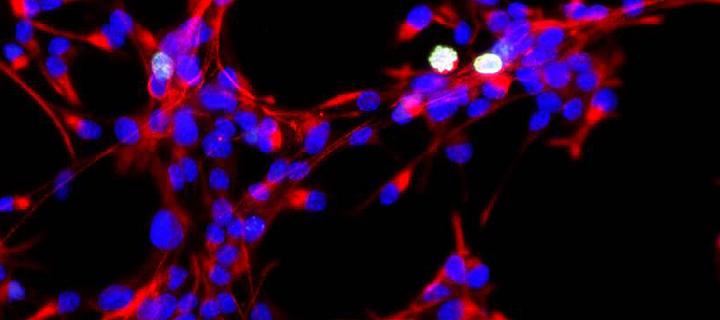Brain cancer study reveals therapy clues
Researchers have pinpointed two key molecules that drive the growth of an aggressive type of adult brain cancer: May 2017

Lab tests
Scientists conducted lab tests on tumour cells from patients with glioblastoma, a rare but aggressive type of brain cancer.
Previous studies have found that glioblastoma cells share similarities with normal brain stem cells, which give rise to the many different cell types in the brain during development.
Key molecules
The team identified two molecules that are produced at high levels by the cells – called FOXG1 and SOX2.
Similar levels of these molecules are found in brain stem cells and are a defining feature of these cells.
Cancer hallmarks
The researchers found that SOX2 drives glioblastoma cells to keep dividing, a hallmark of cancer.
FOXG1 stops the cells from responding to other signals that would usually point them towards becoming specialised, the team found.
Brain cancer cells seem to be hijacking important cell machinery that is used by normal brain stem cells. The tactic they appear to use is to produce high levels of these key regulators. This locks the tumour cells into perpetual cycles of growth and stops them listening to the signals that normally control cell specialisation.
Target genes
Both FOXG1 and SOX2 work by controlling when key target genes are switched on and off by the cell.
The researchers analysed which genes were affected and identified several factors that are involved in controlling cell division.
Therapy hope
The insights could open the door to new therapies that stop or slow tumour growth, the researchers say.
The next step will be for scientists to see if they can develop a way to stop glioblastoma cells from using these molecules as a way to survive and then to test it in clinical trials to see whether this affects tumour growth in people.
Glioblastoma
Glioblastoma is a fast-growing type of brain tumour. There are few options for treatment and only one in five patients will survive more than one year after diagnosis.
The study was led by scientists at the Medical Research Council Centre for Regenerative Medicine at the University of Edinburgh. The research is published in Genes and Development and was funded by Cancer Research UK and the Wellcome Trust.
Related links
MRC Centre for Regenerative Medicine

